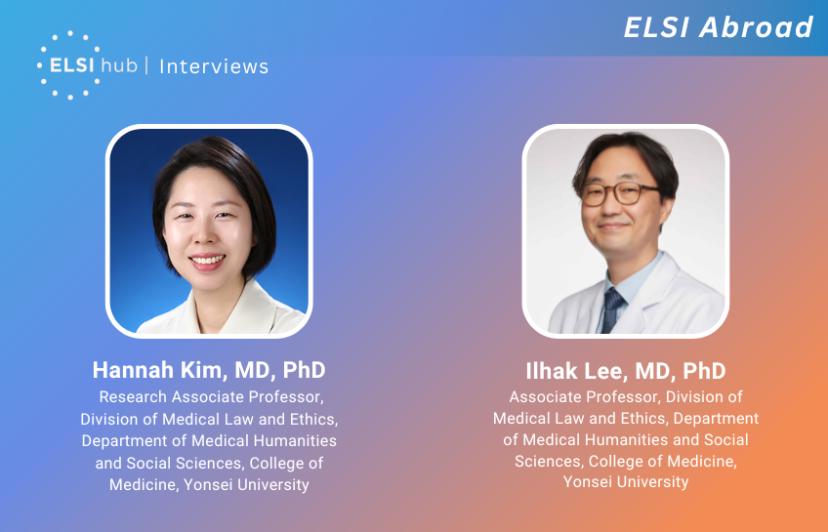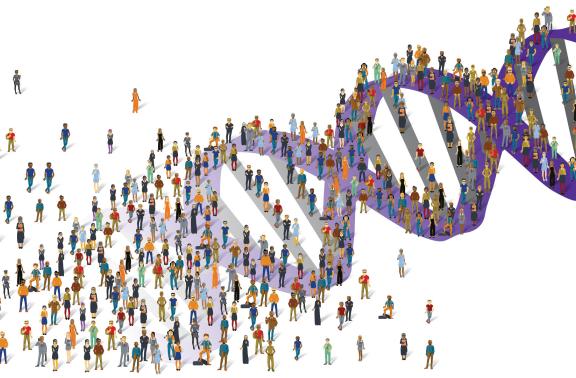
ELSI Abroad: Spotlight on South Korea
In this seventh installment of the ELSI Abroad series, CERA spoke with Ilhak Lee, M.D., Ph.D., and Hannah Kim, M.D., Ph.D., about ELSI research in South Korea. Professor Lee and Professor Kim are colleagues at Yonsei University: Dr. Lee is as an Associate Professor, and Dr. Kim is a Research Associate Professor in the Division of Medical Law and Ethics within the Department of Medical Humanities and Social Sciences at the Yonsei University College of Medicine. They are also researchers at the Asian Institute for Bioethics and Health Law, an academic institute dedicated to convening researchers, policy makers, and the public to create policy that considers important issues in bioethics and promotes better health for all. Profs. Lee and Kim have collaborated on multiple projects and co-authored numerous papers.
Prof. Lee’s primary research interests include end-of-life care ethics and ethical considerations in emerging biotechnologies. He has served as an expert committee member for the Korean National Bioethics Advisory Committee and the National Hospice and Palliative Care Committee. He has also contributed to multiple public health legislations, including drafting South Korea’s End-of-Life Care Decisions Act and serving as a consultant for the Communicable Disease Control Act, Bioethics and Safety Act, and Mother and Children Act. Currently, he is the Chair of the ELSI Committee for The National Project of Bio Big Data (NPBBD) in South Korea (website is in Korean).
Prof. Kim has written extensively on gene editing, 3D bioprinting technology, AI, precision medicine and big data. Her work explores data privacy and data sharing, intellectual property rights, and universal health coverage. She was a member of the Consultation Committee for Direct-to-Consumer Genetic Testing under the Ministry of Health and Welfare and the Institutional Review Board in Severance Hospital at Yonsei University.
CERA: Prof. Lee, what inspired you to focus your work on the ethical, legal, and social implications (ELSI) of genetics and genomics?
Prof. Lee: One of the topics that caught my interest during my bioethics master’s program was genethics. It was an emerging field added to traditional bioethics, which sparked my academic curiosity. Additionally, my time in graduate school (2003-2010) coincided with the establishment and initial implementation of the South Korean Bioethics and Safety Act (2005), which established a national bioethics committee. This ushered in a new period where bioethicists played a key role in introducing and shaping new biotechnology research policies. I later became familiar with the concept of ELSI studies, which happened to align with my past and current research interests.
CERA: What are you working on right now?
Currently, I am tracking public perceptions of bio big data in Korea in anticipation of The National Project of Bio Big Data (NPBBD). Like the All of Us Research Program in the U.S. and the 100,000 Genomes Project in the U.K., the NPBBD aims to integrate the health data, genomic information, and lifelogs of one million Koreans to advance our understanding of health and optimized treatments via precision medicine. Since 2014, the Asian Institute for Bioethics and Health Law at Yonsei University has been conducting an ELSI study to explore the perceptions of citizens, researchers, and clinicians of bio big data. The project will continue to track perceptions of the NPBBD as it expands beyond its pilot phase.
CERA: Prof. Kim, what inspired you to focus on ELSI work?
Prof. Kim: After entering medical school, I went through a period of reflection about whether to pursue a career as a clinician. Inspired by books, movies, and talks at that time, I began to envision a career where I could do research and policy development for a better society. Right after graduating in 2010, I joined a graduate program and began working as a research assistant on an ELSI project, which was a part of the Personalized Genomic Medicine 21 initiative. This was my first step into this field.
CERA: What are you working on right now?
Over the past five years, my team has conducted research on AI ethics in healthcare and education; piloted the National Bio Big Data Project; and recommended policies related to rare disease research, genetic discrimination, and digital nanomedicine. We have also been involved in gene editing research for large mammals, developed guidelines on secondary genomic findings, and created an AI research platform for clinical and genetic data sharing. Next year, we expect to launch new research focused on neonatal genomic sequencing.
CERA: What can you tell us about ELSI research in South Korea?
Prof. Lee: I believe there are various motivations behind ELSI studies in Korea. Researchers in fields such as biolaw, bioethics, and medical anthropology have conducted research based on their own concerns, though they may not have always identified themselves as ELSI researchers. In Korea, the term “ELSI study” first emerged in government-funded research projects (the first being led by science sociologists in 2003). This suggests that the birth of ELSI study in Korea may have been to serve the legal and ethical justification of large-scale, government-led research projects and to help establish institutional frameworks.
Currently, ELSI is not a foreign concept in Korean society; however, it has not yet developed into an independent academic field. This challenge seems to stem from the fact that ELSI study presupposes interdisciplinary collaboration among bioethics, biolaw, and science and technology sociologists. This makes its development more complex.
Prof. Kim: In the early 2000s, ELSI research projects in South Korea aimed to establish research governance through guidelines but faced challenges in advancing its agenda after the enactment of the Bioethics and Safety Act in 2004. The law adopted a restrictive and precautionary approach to genetic testing practices and stem cell research, which hindered the progress of ELSI research. Government-funded ELSI projects re-emerged around 2010, as medical scientists focused on international genomic data sharing recognized its significance.
The South Korean ELSI scholar community is still small but closely connected with a larger group of stakeholders. ELSI researchers in our country aim to provide empirical evidence and consider future directions with them. However, so far, there has been limited engagement with research participants and patients. This remains a challenge that would need long-term financial support to resolve.
CERA: What would you say is the most important ELSI issue in South Korea right now? Why do you think this is so?
Prof. Lee: As mentioned earlier, ELSI studies related to the establishment of bio big data are urgently needed. In addition, the development and application of regenerative medicine also require such studies. These areas are significant for several reasons: 1) public understanding in these fields is not yet well-established, but public engagement is urgently required; 2) there is a need to establish mechanisms for scientific and ethical review in these research areas; and 3) there is an academic interest in examining how the particular characteristics of Korean society may influence universal bioscience research.
Prof. Kim: The first issue would be translating genomic research findings to clinical practice. The current South Korean system has primarily focused on research, but we need to careful consider how genomic medicine should be adapted and respond to research findings. Along with this, ELSI issues related to private genetic testing companies should be addressed as well.
CERA: What ELSI issues do you see that would benefit from multi-country deliberation by ELSI scholars?
Prof. Lee: A topic of particular interest to me is the global sharing of genomic data. For global sharing to be successful, we could consider various approaches, such as utilizing blockchain technology or dynamic consent schemes. However, the response from Korean citizens towards cross-national data sharing has been negative. Comparative studies on this subject could contribute to public engagement by highlighting the need for cooperation and helping to strike a balance between inclusiveness and individuality.
Prof. Kim: I have gained valuable insights through engaging in international discussions. The exchange helps us to understand shared challenges from various perspectives, to learn specific insights, and to foster mutual understanding. Particularly, for large-scale or pioneering research, establishing a common outlook that incorporates Asian perspectives is beneficial. I have also observed that some neighboring countries in our region would benefit from collaborative support. Given the nature of ELSI research, promoting global equity and access to genomic and relevant technologies is essential.
CERA: What three works of ELSI scholarship from South Korea would you recommend to the global ELSI community?
Prof. Lee: Looking at the field, I would recommend the following:
- Yang, J. H., Kim, H., & Lee, I. (2023). Public perceptions and attitudes of the national project of bio-big data: A nationwide survey in the Republic of Korea. Frontiers in Genetics, 14, Article 1081812. This paper will help in understanding Koreans’ perspectives on genomic research.
- Yoon, J. R., Cho, S. K., & Jung, K. W. (2010). The challenges of governing biotechnology in Korea. East Asian Science, Technology and Society: An International Journal, 4(2), 335–348. This paper is valuable for understanding the contributions of the first generation of Korean ELSI researchers.
- Leem, S. Y., & Park, J. H. (2008). Rethinking women and their bodies in the age of biotechnology: Feminist commentaries on the Hwang Affair. East Asian Science, Technology, and Society: An International Journal, 2(1), Article 9. Although this paper doesn’t directly address genomics, it discusses how Korean society understands and approaches new technologies, which is helpful in gauging the contributions of science and technology.
Prof. Kim: In addition to the recommendations from Professor Lee, I would like to suggest the 2021 article, "Genetic discrimination: Introducing the Asian perspective to the debate,” a collaborative outcome of an academic conference and follow-up discussions among Asian researchers. I also recommend Korean language materials from the Korea National Institute for Bioethics Policy, which has published guidelines and reports.
CERA: Is there anything else you would like to say?
Prof. Kim: Our research institute, Asian Institute for Bioethics and Health Law, welcomes ELSI researchers from abroad to visit South Korea to collaborate and discuss shared topics.
Prof. Lee: I am truly delighted to introduce our team’s ELSI research to the CERA community. Just as genomics seeks to find individuality within universality, ELSI studies should strive to achieve the same balance. I look forward to dialogue that respects socio-cultural differences while affirming shared values and our common humanity.
If you would like to be interviewed for a future ELSI Abroad feature, please feel welcome to email us at [email protected]. Please see our other interviews in this series focused on ELSI research in Singapore, Canada, Australia, Belgium, the UK, and Japan.


